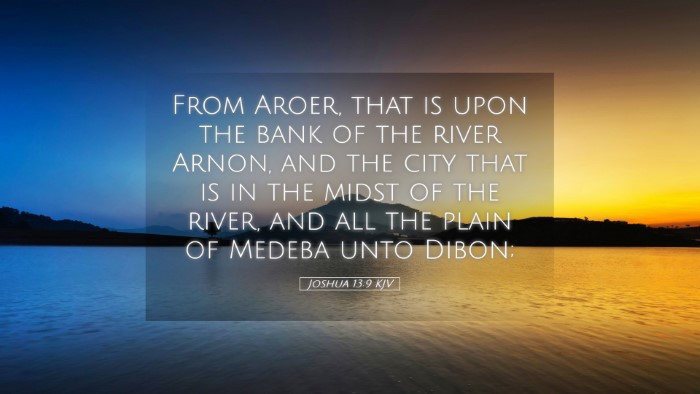Commentary on Joshua 13:9
Verse: Joshua 13:9 - “From Aroer, which is upon the bank of the river Arnon, and the city that is in the midst of the river, and all the plain of Medeba.”
Contextual Overview
The Book of Joshua marks the transition of Israel from wandering to settlement in the Promised Land. The verses in chapter 13 signify a crucial moment in the allotment of territories among the Israelite tribes. This specific verse serves to outline a portion of land already conquered and to highlight the various geographical features of the regions being distributed. Understanding the significance and characteristics of the land allotted is paramount for the broader narrative.
Historical Significance
According to Matthew Henry, the mention of Aroer and the river Arnon points toward a defined boundary of the land, emphasizing God’s fulfillment of promises as His people receive their inheritance. It illustrates the tangible aspect of divine promise—God's blessings are not abstract but have concrete locations and historical realities.
Albert Barnes further elaborates on the significance of ‘Medeba,’ which was historically important. Recognizing the geography uplifts the understanding of where the Israelites settled and how they were to develop their society as a model of God's kingdom on earth. This insight is vital for contemporary theologians as it serves as a reminder of the importance of land and ownership in biblical narratives.
Theological Insights
The verse also serves as a theological interplay between land, inheritance, and divine promise. Adam Clarke notes that the land in question reflects God's faithfulness—His determination to keep covenants made with the patriarchs. This historical verification of land allocation reacts against any theology that minimizes the importance of God's promises made to Israel, reinforcing the idea that God’s presence is intricately tied to specific places and events in history.
- Implication of Divine Presence: The Israelites were to understand themselves not only in a spiritual sense but also as a people with a place ordained by God.
- Significance of Inheritance: Inheritance signifies identity, belonging, and a future, components essential for any community's cohesion.
Practical Applications
For pastors and Bible scholars today, the implications of this verse extend into areas such as social justice, stewardship, and community. As people of faith, there is a responsibility to recognize the value of land and the historical narratives that shape our current understanding of possessions and inheritance. Henry suggests that reflecting on territory and inheritance urges believers to consider how they treat the land and people associated with it.
Additionally, Barnes posits that the acknowledgment of God’s previous providences encourages confidence in God’s ongoing guidance in current spiritual and physical journeys.
Conclusion
Joshua 13:9 is a rich text filled with historical, geographical, and theological depth. The journey of Israel into Canaan reflects broader themes of promise, identity, and community, urging us to engage interactively with biblical geography. The struggles and triumphs of the Israelites serve as an ongoing testimony to God’s faithfulness and serve as a call to inhabitants of the modern world to reflect upon their own inheritances—both spiritual and physical. This passage invites continuous exploration for those seeking to deepen their understanding of biblical texts and their implications for faith and daily living.


